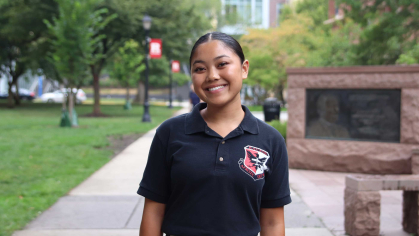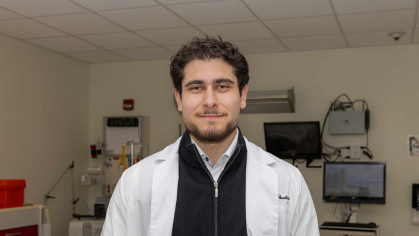High School Student in Rutgers Summer Research Program Wins National Competition

As an intern in the Pathways to Scientist program, Ashley Aguirre learned data analysis and specialized imaging techniques, while studying immune responses
Strike up a conversation with Ashley Aguirre, and you’ll be wowed by her intelligence and maturity. The 17-year-old speaks like a seasoned scientist, knowledgeably discussing neutrophils, macrophages, and other topics most adults know nothing about.
But Aguirre does more than “talk the talk.” She has spent many hours doing hands-on research in a laboratory, as a participant in the joint Rutgers New Jersey Medical School/ Rutgers Institute for Infectious and Inflammatory Diseases Pathway to Scientist program. This initiative provides biomedical research opportunities to talented, highly motivated high school students and teachers in the Newark, N.J. area.
As part of the pathway program, Aguirre spent the summer of 2024 interning in the lab of Veronika Miskolci, an assistant professor of microbiology, biochemistry, and molecular genetics. Miskolci put her to work on a compelling study and the two formed a close bond.
Students experience what’s happening in an actual, active lab. They are exposed to the excitement of biomedical research, with the potential of making significant discoveries.
William C. Gause
Senior Associate Dean for Research, Rutgers New Jersey Medical School
“I’m so grateful for everything Dr. Veronika has done for me – introducing me to lab work and giving me a chance to do real research,” said Aguirre. “The experience has made me realize that I want a career in science.”
“Ashley did excellent work in our lab,” said Miskolci. “Her accomplishments speak for themselves.”
In the spring of 2025, Aguirre presented her research at the annual Afro-Academic, Cultural, Technological and Scientific Olympics competition, sponsored by the NAACP. Thrilled to win first place in the state competition, Aguirre advanced to the nationals, where she had another big win: taking first place in the biology category and second place in medicine and health. She received $3,500 in prize money and a new iPad.
“What a fantastic achievement!” Miskolci said. “We’re very proud of Ashley.”
The oldest of six children, Aguirre is a senior at Newark’s Arts High School. She said she’s always liked science. She learned about the pathway program from her art teacher, who encouraged her to apply. Miskolci had signed on to mentor a student. Impressed by Aguirre’s application, Miskolci set up a Zoom interview. “Speaking with Ashley, I knew right away that she’d be a great fit,” said Miskolci.
A native of Hungary, Miskolci grew up in New York, earning her doctoral degree at Albert Einstein School of Medicine. Following postdoctoral training, she joined the New Jersey Medical School faculty in April 2023. Her lab, as part of the Center for Cell Signaling and the Center for Immunity and Inflammation at Rutgers, studies how the innate immune response is regulated during inflammation and sterile injuries, using zebrafish models of sterile injury in combination with high-tech imaging modalities.

Miskolci has a keen interest in mentoring. As a postdoc, she even took special training in how to be a good mentor. “It can make or break a science career,” she said. “The best training comes from having an active project. I had one for Ashley that I’d been nurturing—studying how macrophages and neutrophils, essential components of the immune system, interact to orchestrate effective immune responses.”
Aguirre joined the lab in July, working three days a week. She was intimidated at first, meeting so many highly trained scientists, all older than her. However, her nervousness disappeared as she got to know her summer colleagues and learned new skills, including data analysis and specialized imaging techniques using a microscope.
“Among the questions we studied were: How does the host (zebrafish) tolerate an unhealthy diet? How does diet influence immune system development? And how does metabolism regulate immune system development?” said Aguirre. “We induced inflammation through injury—that was the unhealthy diet—and studied the immune system response.”
“Ashley is a sponge for learning,” said Miskolci. “You only have to show her something once, and she understands it. She doesn’t let obstacles get in her way.”
Aguirre continued this work into the fall, coming to the lab a few afternoons a week after school. She learned about the Afro-Academic, Cultural, Technological and Scientific Olympics from her guidance counselor and decided to enter. Advancing to the national competition, Aguirre wrote a 20-page paper and prepared a poster, which Miskolci printed on foam board. Aguirre prepared extensively, with Miskolci and her team firing questions at her as the judges would. Her high school teachers provided additional coaching.
“I studied very hard,” said Aguirre. “The judges asked a lot of questions. Because I was so well prepared, I was able to answer all of them. I was really happy to win.”
I studied very hard. The judges asked a lot of questions. Because I was so well prepared, I was able to answer all of them. I was really happy to win.
Ashley Aguirre
This summer, Aguirre has continued in the pathway program, working in the lab of William C. Gause, NJMS senior associate dean for research and part of the pathways “brain trust.” The program is largely funded by the Institute for Infectious and Inflammatory Diseases (i3D), which he directs. Gause notes that a primary goal of the program is to interest high school students in biomedical research as a career option.
“It’s a terrific springboard to college-level science,” he said. “Students experience what’s happening in an actual, active lab. They are exposed to the excitement of biomedical research, with the potential of making significant discoveries.”
Now a high school senior, Aguirre is applying to colleges. She plans to major in biomedical engineering. “I’d like a career in research or medicine,” she said. “I’m interested in cancer research, so maybe I’ll go into oncology.”
She added: “I couldn’t have done any of this without Dr. Veronika’s support.”



